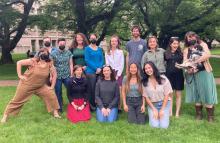The UW Center for Evaluation & Research for STEM Equity (CERSE) has been a part of UW for over 20 years and joined Sociology in 2016. It is a self-sustaining, interdisciplinary research center with the mission to improve equity and inclusion, and broaden representation in STEM fields (Science, Technology, Engineering, and Math) particularly in higher education. This work is critical. The STEM fields shape our lives in innumerable ways and a diverse workforce is necessary for developing equitable solutions to the problems our global societies face. Yet these fields have much room to grow to improve diversity, equity, and inclusion.
While CERSE’s home is UW Sociology, the center has a broad reach across multiple departments and has been doing this work through research, program evaluation, and equity consulting. In recent years, our team has comprised 12-18 individuals, including graduate and undergraduate students and permanent research and administrative staff. Since 2003, we have worked with more than 100 graduate and undergraduate UW students as CERSE RAs, including at least 33 students from Sociology (please keep an eye out for future openings!). By working with CERSE, students gain training in research and evaluation, and valuable academic experience every step of the way. Some students co-author publications and present their work to collaborators and at conferences.
We have also collaborated with a wide range of partners, including more than a dozen units at the UW, 18 additional colleges and universities, and nine national organizations. Some of these collaborators have included the UW Bothell and Tacoma campuses, the UW Office of Minority Affairs & Diversity and College of Engineering, the American Society for Engineering Education, the Association of Public and Land Grant Universities, and the National Center for Women & Information Technology. Annually, CERSE brings roughly $1 million in funding to the UW.
CERSE research focuses on both the participation of individuals belonging to systemically marginalized groups in STEM educational fields and the workforce as well as the processes of change to create more equitable STEM educational environments. Evaluation reports provide program administrators with information needed to identify areas for improving their program as well as summative findings that measure program outcomes. Programs with a strong emphasis on equity and inclusion often aim to boost recruitment efforts and programmatic/institutional supports for students and professionals belonging to groups that have been historically marginalized in STEM. Over time, this can help broaden participation in these fields.
Some recent highlights:
- Hanna Moss, former CERSE undergrad student assistant, won the best poster award at the 2022 PNW LSAMP regional conference for research conducted under the supervision of CERSE Senior Research Scientist Dr. Emily Knaphus-Soran.
- The UW-based national BRAINS program was awarded its third NIH R25 for $1.35 million over five years to support diversity in academic neuroscience. Until recently, former CERSE Assistant Director Dr. Cara Margherio led the evaluation of BRAINS starting with its inception in 2011.
- CERSE Research Scientist Dr. Erin Carll is the research Co-PI for the $1.1 million, six-year UW Department of Statistics NSF Scholarships in STEM (S-STEM) award for the Pacific Alliance for Low Income Inclusion in Statistics & Data Science project, in which Sociology’s Dr. Tyler McCormick is also participating as a faculty member of Statistics.
- CERSE Director Dr. Elizabeth (Liz) Litzler is leading the evaluation for the establishment and administration of the American Association for the Advancement of Science (AAAS) NSF S-STEM Resource and Evaluation Center. This work will bring more than $650k to the UW over five years.
